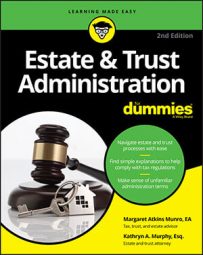All the Form 706 schedules up to Schedule J deal with the decedent’s assets. With Schedule J: Funeral Expenses and Expenses Incurred in Administering Property Subject to Claims, you’re finally beginning the portion of the tax return where you take every last deduction you can on behalf of the decedent (except those you may elect to take on the estate’s income tax return).
If you’re using Schedule PC for expenses that aren’t currently deductible under IRC Section 2053, report the expense on Schedule J with no value in the last column.
On Schedule J, you include funeral expenses and expenses incurred in administering property subject to claims. The phrase property subject to claims refers to property available to pay the decedent’s creditors.
The decedent’s local (state) law will determine which property is subject to claims. Include on Schedule J each separate expense, itemizing each with the name and address of the person or entity to whom or to which the expense is payable, as well as the nature of the expense.
Generally speaking, administrative expenses must be deductible under state law and be considered “reasonable and necessary” by the IRS for them to be deductible on the 706. What’s reasonable and necessary?
There’s no set standard; rather, it’s more a sense of knowing it when you see it. If the 706 you prepared is audited, though, be prepared to substantiate your expenses with receipts and, where necessary, with a scope of the work that’s been performed. The IRS loves nothing more than slicing off a portion of the executor’s fee as being excessive.
Although the deduction is limited to the amount allowable under local law, it also can’t exceed the total of the value of property subject to claims in the gross estate and the amount of expenses paid out of property included in the gross estate but not subject to claims.
Don’t deduct expenses of property not subject to claims on Schedule J! Those expenses are properly deducted on Schedule K. If you can’t determine the exact amount of certain expenses by the time the Form 706 is due, estimate as accurately as you can.
Funeral expenses
Itemize all funeral expenses on line A, Schedule J. These expenses include all miscellaneous items billed by the funeral home; flowers; a newspaper funeral announcement; a tombstone, monument, mausoleum, or burial plot for the decedent and his or her family; and travel expenses for one person to accompany the body to the place of burial if traveling a distance.
Note: If your decedent was a veteran and the VA provides a burial marker, you don’t have that expense to deduct.
Although deducting the cost of the funeral luncheon has been common practice, a tax court case recently disallowed such a deduction in Michigan. They questioned the reasonableness of the expense, the lack of detail on the 706 regarding the expense, and the fact that the luncheon seemed to be to thank people in the decedent’s life, rather than to eulogize the decedent, as would be typical at a funeral service.
It was also held at a different location than the funeral service. Whether this ruling will apply beyond the specific facts of that case remains to be seen, so tread carefully when deducting that post-funeral feast until the tax court issues further rulings.
Unless the Social Security death benefit is paid to the surviving spouse, reduce the funeral expense deduction by any amounts you receive from the Social Security Administration (currently, and for many years past, $255). If the decedent received any death benefit from the Veterans’ Administration, treat it the same way. Remember the fifth grade? Show your math right on Schedule J!
Administration expenses
On line B of Schedule J, list the administration expenses for your executor commissions, attorney fees, and accountant fees, indicating whether they’re amounts estimated, agreed upon, or paid. If you don’t have a probate estate, enter the amount of the trustees’ fees of the revocable (now irrevocable) living trust on line B1.
If both executors’ and trustees’ fees are being charged, enter the trustees’ fees as a miscellaneous expense under item B4. Note: If the decedent arranged to pay the executor through a bequest or devise, you can’t deduct the payment.
It is strongly recommended that you fill in, sign, and date Form 4421, Declaration of Executor’s Commissions and Attorney’s Fees, reference it on line B1, and attach it to the 706 as an exhibit. This action expedites the audit process. Form 4421 contains a statement as to how much of the attorney fees and executor fees are being taken as a deduction on an income tax return.
Other expenses you may deduct on Schedule J include
Appraisers’ fees
Probate court filing fees
Certified copy charges and the like
Guardian ad litem fees
Brokers’ and auctioneers’ fees (but only if the sale was necessary to pay taxes, debts, or expenses of administration, to preserve the estate, or to effect distribution of the property)
Maintenance expenses of estate property (including insurance)
Investment advisors’ fees
Other miscellaneous expenses related to the estate such as telephone bills, mileage, and postage
Even interest expenses you incur as executor after the decedent’s death are deductible if they’re reasonable, necessary to the administration of the estate, and deductible under local law. But if you elect to pay the estate tax in installments under IRC Section 6166, you can’t deduct any interest expenses incurred on the installments on the 706. Don’t forget about them, though — you can deduct them on the estate’s Form 1041.

